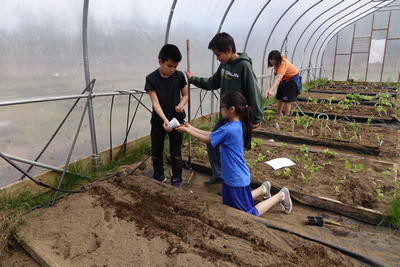Community Gardens Provide Healthy Food
Schools partner with communities to serve kids healthy, locally harvested food
Community gardens provide healthy food for schools
School districts are partnering with their communities to serve healthy, locally harvested food to children during school. Involving children in gardening is a great way to support physical activity and healthy eating, as well as build a sense of contributing to their community.
Growing community gardens to support the school food program
Kenai Peninsula Borough School District, Tyonek — Tebughna School is a K-12 school in the small community of Tyonek, which is across the inlet from Anchorage. Working with the Tyonek Tribal Conservation District (TTCD), the school added a community garden program into their school day. The Tyonek Grown Program involved youth in a community effort to provide food for their elders and for their own school snack and lunch program.
Tyonek Tribal Conservation District, a nonprofit tribal conservation organization, built the community garden program to provide healthy, affordable fruits and vegetables for families and children. Gardening made more nutritious options available for this community. With no grocery store in town, the only other option was to buy or order more groceries from Anchorage, which is pricey and limits the fresh, quality foods they can have and eat.
"Perishable items like fruits and vegetables are expensive and difficult to ship," said the Tyonek Grown Program business plan.- costing at least 36 cents per pound to ship by plane from Anchorage. This leads to a shortage of these healthy foods, in favor of processed foods with preservatives, the plan said, and "contributes to the growing diabetes problem and other health problems in Tyonek."

Increasing food security
Through TTCD's Tyonek Grown Program, the community garden improves food security for residents who aren't able to get fresh foods from elsewhere. This program gives residents an opportunity to eat healthier foods grown locally.
The community garden has about 1.5 acres available for operation, two seasonal high tunnels, more than a dozen outdoor raised beds, as well as crops of potatoes, other vegetables and fruits. An early priority of the community garden was to include the youth in the project and bring back gardening to the community. In addition to providing lower cost food, gardens can also increase physical activity for kids and adults who work in them.
Learning through gardening
Students help start and care for the seeds in the Tebughna School. They plant, water the garden and harvest produce, according to the business plan. Students even wanted to start hydroponics, or growing plants without soil.
Tonya Kaloa, the Program Assistant for TTCD, is a Tyonek tribal member and shareholder. Kaloa said the conservation and science focus of the project is what they teach kids in school, and this lends itself to conversations about diabetes prevention, nutrients and the health aspects of the fresh grown food.
"They are taught to use their brain, talk together, communicate and eat together as part of the process," she said. Hands-on conservation science lessons are part of another TTCD program in the school called Tyonek Youth Conservation and Science.
"The hydroponics aspect was added last year and this came from conversations with the youth in Tyonek over the years. They wanted to see hydroponics, and it was added in November of last year (2017)," Kaloa said. "Now that this has been added, they can see the difference between hydroponics and growing (in gardens)."
How to support change
This is what Alaska communities are doing to help kids grow up healthy. What can your community do?
For ideas on how to provide healthy foods, drinks, and physical activity for kids, return to:
Success in Schools